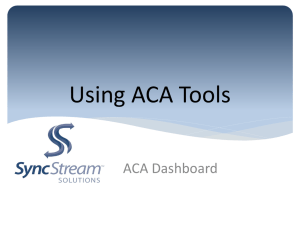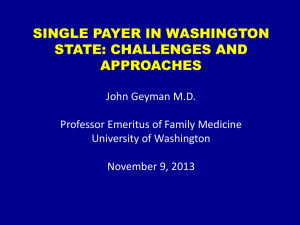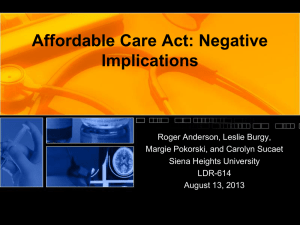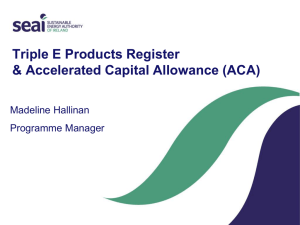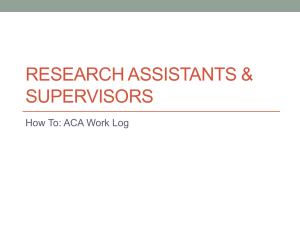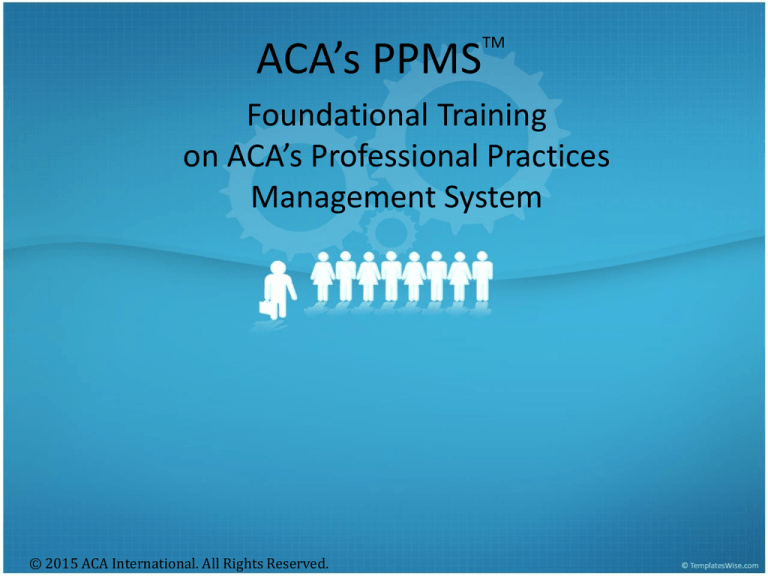
ACA’s PPMS
TM
Foundational Training
on ACA’s Professional Practices
Management System
© 2015 ACA International. All Rights Reserved.
Session A
Welcome!
© 2015 ACA International. All Rights Reserved.
Meet Your Instructor – Brian Watkins
Brian Watkins began in the collection industry as a
salesperson for Southern Oregon Credit Service in
1990. In 2001, Brian and his wife Denise purchased
the company. Most of the business is third-party
collections for healthcare, with additional work for
finance, higher education, property management,
government and commercial businesses.
Brian has twice served as president of the Oregon
Collectors Association, and has served on the
Legislative Committee for his state unit for over 14
years, and currently is Chairman. He has twice earned
the Unit Leader of the Year Award from ACA, and
currently serves on the PPMS Committee, the
Governance Task Force, and as a Certified Instructor
for ACA. Southern Oregon Credit achieved PPMS
Certification in 2008.
© 2015 ACA International. All Rights Reserved.
Legal Disclaimer
Any content included in this presentation or discussed during this
session (“Content”) is presented for educational and general reference
purposes only. ACA International, either directly or through speakers,
independent contractors, employees or members of ACA International
(collectively referred to as “ACA”) provides the Content as a courtesy to
be used for informational purposes only. The Contents are not intended
to serve as legal or other advice. ACA does not represent or warrant that
the Content is accurate, complete or current for any specific or particular
purpose or application. This information is not intended to be a full and
exhaustive explanation of the law in any area, nor should it be used to
replace the advice of your own legal counsel. ACA is the sole owner of
the Contents and all the associated copyrights. ACA hereby grants a
limited license to the Contents solely in accordance with the copyright
policy provided at www.acainternational.org. By using the Contents in
any way, whether or not authorized, the user assumes all risk and
hereby releases ACA from any liability associated with the Content.
The views and opinions of the speakers expressed herein are solely
those of the presenters and not ACA International.
© 2015 ACA International. All Rights Reserved.
What to Expect
• Fast paced training that covers a crash course of
the basics of PPMSTM
• Covers only the requirements of PPMSTM: the
MUST HAVES versus the NICE to HAVES
– Overview of the Required Forms and elements
for those forms, not every element
– Relies on self-paced reading and homework to
practice
– How to use the sample manual and templates
© 2015 ACA International. All Rights Reserved.
1
What to Expect
• When you are done with this course you
should:
–Understand what is required to become
certified
–Understand how to use the sample
materials/reference aids
–Have a next step to get started
© 2015 ACA International. All Rights Reserved.
2
Polling Questions
The number of employees at my company is:
a. 1-25
b. 26-100
c. 101-250
d. 250+
My level of experience with PPMSTM is:
a. I’ve attended the Introduction to PPMSTM 2 hour class.
b. I’ve attended the two-day face-to-face PPMSTM training.
c. Our company is working toward PPMSTM Certification – I am here to
get a “boost.”
d. Our company is already PPMSTM Certified – I am here as a refresher
or a new staff member.
e. This is my first PPMSTM class of any kind.
What are you hoping to gain from this seminar?
© 2015 ACA International. All Rights Reserved.
3
Course Outline
Session A:
• Introduction – Overview of Elements
• Element 1 Management Vision/Mission
• Element 3 Client Issue Form and Log
• Element 11, 12 Nonconformity/Continuous
Improvement
• Element 16 Training Checklist
• Homework Assignment - write a client
issue/Nonconformity
© 2015 ACA International. All Rights Reserved.
4
Course Outline Continued
Session B :
• Questions from homework
• Format of a procedure
• How to document a procedure
• Homework assignment
Session C:
• Questions from homework
• Auditing Element 15
• Overview of Certification Process
• Discuss how/who should be the PPMS Team Leader
and where to begin
• Question & Answer
© 2015 ACA International. All Rights Reserved.
5
Definition of Key Terms*
•
•
•
•
•
•
•
•
•
•
•
Professional Practices Management System (PPMSTM)
Certification
Subscription
Company Procedures (CP)
Company Forms (CF)
Company Work Instructions (WI)
Surveillance
Evaluation
Major Non-conformance
Minor Non-conformance
CliftonLarsonAllen LLP (CLA)
– *See pg 7 in Volume One: Reference Materials Manual under Tab01 Introduction for full definitions
© 2015 ACA International. All Rights Reserved.
6
TM
PPMS Elements - Introduction
• What is the purpose of the ACA
PPMS ?
TM
– The purpose of the ACA PPMS is
to provide a framework that will
help agencies continuously
improve and save money!!!
TM
© 2015 ACA International. All Rights Reserved.
7
What is an Element?
• Principals
• Assumptions
• Mindset
© 2015 ACA International. All Rights Reserved.
8
TM
PPMS
Elements
• Overview of the elements that contain
required forms :1, 3, 11, 12, 14, 15, 16
• The remaining elements and descriptions
are found in Volume One: Reference
Materials Manual under Tab03 PPMSTM
Elements on pages 37-161.
© 2015 ACA International. All Rights Reserved.
9
What is a Required form and
how do I use them?
• A form that must be completed in order to acquire
PPMSTM certification.
• You must keep the information that is on the form in a
similar format.
• You cannot remove anything from the form but you can
add to the form.
• If you have multiple offices and are certifying all offices,
you must indicate on the logs, which office is represented
by the issue. This is an example of something to add to
the forms, office or location.
© 2015 ACA International. All Rights Reserved.
10
What is a Required form?
(continued)
• You can rename the forms title (Client
Concern versus Issue)
• The form must remain under the
element they reside
• All forms must have the element
number incorporated into the form
name. See example in Volume Two:
PPMS Sample Manual on page 19 CF
Client Issues Log (302-2).
© 2015 ACA International. All Rights Reserved.
11
Volume One: Reference Materials Manual
Table of Contents
Tab01 Introduction………………………………………..……………....pg. 1
Tab02 Overview & Setting Up….…………………................................pg. 19
Tab03 PPMS Elements……………………………..…..………………..pg. 27
Tab04 Planning…………………….……………………………………..pg. 195
Tab05 Documenting……………………………………………….……..pg. 213
Tab06 Implementing……….…………………………………………….pg. 271
Tab07 Cost Reduction/Continuous Improvement………….…………pg. 323
Tab08 PPMS Application…………………………….………………….pg. 345
Tab09 The Advantages of the PPMS…………...........................……pg. 393
Tab10 Auditing……………………………………........................……..pg. 407
Tab11 Change Management…………….……….......................……..pg. 443
Tab13 PPMS Q&A…………………………………........................……pg. 467
Tab14 Compliance handouts………………….….......................……..pg. 474
Tab16 Required Forms………….……………........................………...pg. 479
Tab17 Element 18 Appendix…………………...........................……….pg. 499
Tab18 CFPB Appendix…………………………………………………...pg. 575
© 2015 ACA International. All Rights Reserved.
12
All PPMSTM Elements*
List of PPMSTM Elements
1 - Management Responsibility
2 - Management System
3 - Review Of Client Issues
4 - Document & Data Control
5 - Purchasing
6 - Control of Client & Customer Supplied Data
7 - Data Identification & Traceability
8 - Process Control
9 - Inspection & Testing
10 - Inspection & Test Status
11 - Identification of Nonconformity
12 - Corrective Action, Preventive Action & Continuous Improvement
13 - Handling, Storage, Preservation & Delivery
14 - Management of Records/Data
15 - Internal Management Audits
16 - Training
17 - Process & Client Satisfaction Measurements
18 - Information Management Systems & Data Protection
*For a list of the elements and their full descriptions see page 31 in the Volume One:
Reference Materials Manual
© 2015 ACA International. All Rights Reserved.
13
All Required Forms
All forms are in Volume Two: PPMSTM Sample Manual under the Forms tab
•
•
•
•
•
•
•
•
•
•
•
Management Review Checklist (101-1)……………………………...…..pg. 6
Trend Analysis Form (Jan-June) (102-1)………………………….……..pg. 7
Trend Analysis Form (July-Dec) (102-2)…………………………...…….pg. 8
Client Issues Log (302-2)………….……………….……………………....pg. 19
Nonconformity & Corrective/Prevention Action Report (1201-1)……...pg. 29
Nonconformity & Corrective Action Log (1201-2)..................................pg. 30
Continuous Improvement Project Log (1201-3)……………………….....pg. 31
Continuous Improvement Status Report (1201-4)…………………….....pg. 32
Internal Audit Checklist (1503-1)…………………………………………...pg. 42
Training Course Log (1603-1)…………………………………...………....pg. 54
Newly created form, not yet in Sample Manual: Consumer Issue/Concern Log 1402-1
© 2015 ACA International. All Rights Reserved.
14
What is the Sample Manual and how do I use it?
• The Manual is a complete sample for what you need in order
to be certified. Turn to page 5 in the PPMSTM Sample
Manual under the Procedures tab.
• Use these as templates to write your own procedures.
• The naming convention begins with either a WI for Work
Instruction, a CM for Company Policy, a CP for Company
Procedure or a CF for Company Form.
• Followed by the element #, a sequential number for tracking
and the description
© 2015 ACA International. All Rights Reserved.
15
© 2015 ACA International. All Rights Reserved.
16
Element 1 : Management
Responsibility
• Discuss Element 1: What management
responsibility means
• Review a sample management policy statement
• Review the Annual Management checklist
• Review the Trend Analysis logs
© 2015 ACA International. All Rights Reserved.
17
1 - Management Responsibility
Reviewing vision, mission, goals and expectations
• What is it?
• Documentation of executive management’s
business policy concerning:
•
•
•
•
information security
client satisfaction
continuous improvement
prevention of negative impacts on the collection industry
• Periodic review of the management system to
compare performance to management policy
© 2015 ACA International. All Rights Reserved.
18
1 - Management Responsibility
Reviewing vision, mission, goals and expectations
Example(s)
•Executives review annual agency results
• Performance
– i.e. recovery percentages
• Management Review Checklist (101-1) – Required Form
– Forms Section (PPMS™ Sample Manual) page 6
• Trend Analysis Forms (102-1) & (102-2) – Required Forms
– Forms Section (PPMS™ Sample Manual) page 7-8
•Information & Communication
• Manager meetings
• Staff meetings
• Employee performance reviews
© 2015 ACA International. All Rights Reserved.
19
Management Review Checklist (101-1)
Management Review Check Sheet
Date
Time
Agenda*
1
Financials
2
Management Policies and
Objectives
3
Client Issues
4
Compliance Programs
5
Client Satisfaction
6
Continuous Improvements
(Progress of Projects)
7
Audit Results
8
Performance Measurements
against Goals
9
Legal Review
10
Information Security
Location
Presented By
Date Completed
11
12
* Please submit the minutes of the meeting.
© 2015 ACA International. All Rights Reserved.
20
© 2015 ACA International. All Rights Reserved.
21
© 2015 ACA International. All Rights Reserved.
22
Element 1
Sample
Policy –
PPMSTM
Sample
Manual page
18-19 under
PPMS
Policies tab
© 2015 ACA International. All Rights Reserved.
23
Client Issue Form and Log Element 3
• Discuss Element 3 client issue what it is and
examples
• Element 3 Form – How to use it
– Client Issues Form (302-1) – Sample 1 on page 18
• How to log
– Client Issues Log (302-2) – Required Form
© 2015 ACA International. All Rights Reserved.
24
3 - Review of Client Issues
Determining company’s ability to meet client’s needs and
expectations
• What is it?
– A formal comparison of client requirements against an
agency’s ability to meet those requirements
• Define client’s needs & expectations
• Review and track client’s needs & expectations and
concerns or issues
• Review regulatory requirements
• Define communication protocol
• Track amendments to agreements
© 2015 ACA International. All Rights Reserved.
25
3 - Review of Client Issues
Determining company’s ability to meet client’s needs and
expectations
• Example(s)
– Listing accounts under the wrong client number
– Health care account sent to agency without patient names
– Client complains about a collector
– Client has service interruptions
– Client Issues Form (302-1)
• Forms Section (PPMS™ Sample Manual) page 18
© 2015 ACA International. All Rights Reserved.
26
Client Issues Form 302-1
© 2015 ACA International. All Rights Reserved.
27
Client Issues Log (302-2)
CI Log
#
Client
Receiv
ed By
Action
Assigned
To:
Date
Received
*NCAR
#
Date
Closed
*NCAR - Non-conformance Corrective Action Requirement
© 2015 ACA International. All Rights Reserved.
28
Nonconformity: Element 11
• Discuss Element 11
• What is a Nonconformity
• How to use the form and the log
– Nonconformity & Corrective/Prevention Action Report
(1201-1) – Required Form
– Forms Section (PPMSTM Sample Manual) page 29
© 2015 ACA International. All Rights Reserved.
29
11 - Identification of Non-conformity
Identifying and recording mistakes or problems
• Example(s)
– Client requirements not followed
– Internal agency procedures not followed
– Nonconformity & Corrective/Prevention
Action Report (1201-1) – Required Form
• Forms Section (PPMS™ Sample Manual)
page 29
© 2015 ACA International. All Rights Reserved.
30
Nonconformities
Major Nonconformance
• A Major Nonconformance is a major breakdown in the
organization’s system that could or has impacted the
company or its clients. If left unchecked it could result in
losing a client or a lawsuit being filed.
Minor Nonconformance
• A Minor Nonconformance is most often an internal
mistake which does not impact the client directly, will not
result in a lawsuit but nonetheless costs the organization
because of the inefficiency and rework it necessitates.
© 2015 ACA International. All Rights Reserved.
31
Nonconformity & Corrective/Prevention Action Report (1201-1)
Department:
Corrective/Preventive Action #:
Date opened Corrective/Preventive Action:
Targeted/Proposed Resolution Date
1. Describe Non-conformity or Goal of Preventive Action:
Written by:
Supervisor’s Signature:
Dat
e:
ACA Element #:
2. Action taken to contain non-conformity (i.e., if applicable):
Action taken by whom:
Date:
3. Team or individual assigned to solve problem or potential problem:
4. Root Cause of the problem or potential problem:
Date:
5. Corrective/Preventive Action recommended to solve problem:
Date:
6. Date Corrective/Preventive Action implemented:
7. Describe effectivity results (i.e., did the corrective/preventive action solve the problem):
Compliance Officer Signature:
Date Corrective/Preventive Action closed:
8. Date reviewed for trend analysis:
9. Comments:
Major Non-conformance
Minor Non-conformance
© 2015 ACA International. All Rights Reserved.
32
Nonconformity & Corrective Action Log (1201-2)
Corrective
Action
Number
Date
Opened
Assigned
Team or
Individual
* Projected
Corrective
Action
Solution Due
Date
© 2015 ACA International. All Rights Reserved.
Date
Corrective
Action
Implemented
Date
Corrective
Action
Reviewed
for
Effectivity
Date
Closed
Element of the
PPMSTM
(*Major Nonconformance)
33
Continuous Improvement: Element 12
• Discuss Element 12
• What is a continuous improvement
• How to log and track continuous improvements
– Nonconformity & Corrective Action Log (1201-2) – Required Form
– Forms Section (PPMSTM Sample Manual) page 30
© 2015 ACA International. All Rights Reserved.
34
12 - Corrective Action, Preventive Action & Continuous
Improvement
Correcting and preventing problems by finding a better, faster or more reliable
way to accomplish work
• What is it?
– Investigation & elimination of root causes of
Nonconforming activities at any point in an agency’s
service
– Testing or proving the adequacy of procedures/processes
to prevent occurrence of Nonconforming services in the
first place
– Re-engineering processes to improve services & reduce
cost
© 2015 ACA International. All Rights Reserved.
35
12 - Corrective Action, Preventive Action & Continuous
Improvement
Correcting and preventing problems by finding a better, faster or more reliable
way to accomplish work
• Example(s)Turnover is high
• Corrective/Preventive Action
– Revamping the interviewing process to include behavioral based
question to better define candidates’ abilities whereby reducing
turnover.
– Start conducting second interviews to get the candidates back into
the office, observe additional behaviors, getting others involved for
second opinions.
© 2015 ACA International. All Rights Reserved.
36
Continuous Improvement Status Report (1201-4)
Assigned Team or Individual:
File Locator ID:
Date Continuous Improvement Started
ACA PPMSTM Element #:
A. Briefly Describe Continuous Improvement Project:
Written by:
Date:
B. Key Status Milestones, if any (example – planning stage, training, pilot program,
implementation, etc.):
Written by:
Date:
1. First Milestones - Describe what was accomplished:
Scheduled Completion Date:
Written by:
Date:
2. Second Milestones - Describe what was
accomplished:
Scheduled Completion Date:
Written by:
Date Completed:
3. Third Milestones - Describe what was accomplished:
Scheduled Completion Date:
Written by:
Date Completed:
4. Fourth Milestones - Describe what was accomplished:
Scheduled Completion Date:
Written by:
Date Completed:
5. Project Completed - Describe what was accomplished:
Scheduled Completion Date:
Written by:
Date Completed:
© 2015 ACA International. All Rights Reserved.
37
Continuous Improvement Project Log (1201-3)
Description of
Continuous
Improvement Project
Assigned
Team or
Individual
© 2015 ACA International. All Rights Reserved.
File
Locator
ID
Date
Project
Started
Date
Project
Completed
Element of
PPMSTM
38
Consumer Issue/Concern Log 1402-1
CIC Log #
Complainant/Consumer
Identifier*
Account
Number
© 2015 ACA International. All Rights Reserved.
Entered
Date/Consumer
& Issue
Received
Source
Client Indicator
Date
Responded
Date Closed
Audit: Element 15
• This element has a required form but
will be discussed in Session C on day 3.
© 2015 ACA International. All Rights Reserved.
39
Training Checklist : Element 16
• Discuss the training element and
requirements
• Discuss the log and how to use it
– Training Course Log (1603-1) – Required Form
– Forms Section (PPMSTM Sample Manual) page 54
© 2015 ACA International. All Rights Reserved.
40
16 - Training
Continuous training of all staff
• What is it?
– A structured process to support staff training
needs that will allow employees to perform job
requirements efficiently and effectively including:
• Development of a training plan by role or individual
• Training of personnel to meet training needs and
certification requirements
• Maintaining records of individual qualifications and
accomplishments in support of performance
evaluations and certification requirements
© 2015 ACA International. All Rights Reserved.
41
16 - Training
Continuous training of all staff
• Examples
ACA International’s Code of Ethics (Required Annually)
FDCPA Training
FCRA Training
Credit & Collection Compliance Officer Workshop (CCCO)
Telephone Collection Techniques
Skip Tracing Training
HIPAA Training
Application Systems Training
Technical Infrastructure Training
Basic training on job duties for new hires, ensuring that records
are kept for those sessions and ongoing training is conducted for
staff
– Training Course Log (1603-1) – Required Form
–
–
–
–
–
–
–
–
–
–
• Forms Section (PPMS™ Sample Manual) page 54
© 2015 ACA International. All Rights Reserved.
42
Training Course Log (1603-1)
Description of Training Course
Date
No. of People in
Attendance
Length of
Course
(hrs.)
Reminder: Attendance at this training program satisfies
the requirement that one training program is necessary
per year.to become certified and one training program
per year to maintain certification after the first year.
© 2015 ACA International. All Rights Reserved.
43
18 – Information Management Systems & Data Protection
Ensuring availability of systems, integrity of applications and data, and confidentiality of
information
– This element is covered in greater detail in the
Element 18 Appendix tab.
– Only requirement for this element is the one required
procedure.
– Sample forms: Hardware Asset Inventory (1801-1) and
Software Asset Inventory (1801-2)
– Forms Section (PPMSTM Sample Manual) page 57-58
© 2015 ACA International. All Rights Reserved.
44
Homework Assignment
• Review the entire list of elements descriptions and
be prepared to ask any questions if they are
unclear. See pages 37-161 under Tab 03 PPMS
Elements in the Reference Materials Manual.
• Write a client issue and log it
• Identify and write a Nonconformity and log it
© 2015 ACA International. All Rights Reserved.
45
Homework:
Writing a Client Issue
Objective: Understand how to write a client issue and to become
familiar with the form and the log.
• Scenario #1: A client e-mailed you stating that the electronic new
business file that was sent two weeks ago has not been loaded.
They never received an acknowledgement of the business or
confirmation that it was loaded.
• Please use a blank client issue, found under the Tab03 PPMS
Elements on pages 53-54 in the Reference Materials Manual to
complete this homework assignment, complete the forms.
© 2015 ACA International. All Rights Reserved.
46
Homework: Write a Nonconformity and log it
Objective: Understand how to write a Nonconformity and to become
familiar with the form and the log. Please write a Nonconformity and log
it on the Nonconformity log form (see following slides).
Scenario 1: XYZ agency’s procedures state that collection center
personnel will be periodically reviewed for performance and that training
will be provided for those found to be deficient in education, knowledge
or skills. You, the auditor, come across 3 people in the collection center
who were hired 3 months ago. When you review their training records,
you find no evidence of any training in FDCPA or telephone collection
techniques. You decide to review their personnel files and find no
previous experience in the collection industry.
© 2015 ACA International. All Rights Reserved.
47
Nonconformity & Corrective/Prevention Action Report (1201-1)
Department:
Corrective/Preventive Action #:
Date opened Corrective/Preventive Action:
Targeted/Proposed Resolution Date
1. Describe Non-conformity or Goal of Preventive Action:
Written by:
Supervisor’s Signature:
Dat
e:
ACA Element #:
2. Action taken to contain nonconformity (i.e., if applicable):
Action taken by whom:
Date:
3. Team or individual assigned to solve problem or potential problem:
4. Root Cause of the problem or potential problem:
Date:
5. Corrective/Preventive Action recommended to solve problem:
Date:
6. Date Corrective/Preventive Action implemented:
7. Describe effectivity results (i.e., did the corrective/preventive action solve the problem):
Compliance Officer Signature:
Date Corrective/Preventive Action closed:
8. Date reviewed for trend analysis:
9. Comments:
Major Nonconformance
Minor Nonconformance
© 2015 ACA International. All Rights Reserved.
48
Nonconformity & Corrective Action Log (1201-2)
Corrective
Action
Number
Date
Opened
Assigned
Team or
Individual
* Projected
Corrective
Action Solution
Due Date
© 2015 ACA International. All Rights Reserved.
Date
Corrective
Action
Implemented
Date
Corrective
Action
Reviewed
for
Effectivity
Date
Closed
Element of the
PPMSTM (*Major
Nonconformance)
49
Summary of Session A:
• Overview of PPMSTM program
• How to use the sample manual
and forms
• Overview of Elements that have
required forms
• Homework to practice forms
Any Questions?
© 2015 ACA International. All Rights Reserved.
50
Session B
Welcome back!
© 2015 ACA International. All Rights Reserved.
51
Session B Agenda:
• Answer any questions from the
homework assignment
• Discuss the levels of documentation
• Discuss the format of a procedure
• How to document a procedure
• Homework assignment
© 2015 ACA International. All Rights Reserved.
52
Review Homework from Session A
• Review the sample client issue and
Nonconformity form/logs
• Did you understand the forms?
• Any questions from previous day?
© 2015 ACA International. All Rights Reserved.
53
Developing a PPMS Structure
TM
Element 2 - Management System
DETAIL
Procedures
Work Instructions
© 2015 ACA International. All Rights Reserved.
Manager,
Supervisor
NUMBER OF
WORDS
Policies
President, Owner, Top
Managers
Front line worker
& all
54
TM
Developing a PPMS Structure
2 - Management System
• Procedures
– Procedures are a requirement of the ACA PPMSTM
Program. You must have one procedure for each element
at a minimum
– Focus on processes (standardization & consistency)
– Help reduce mistakes (i.e., who is responsible for what
actions and sometimes how to perform a task)
– Identifies any records and forms that support the procedure
– Help as training tools
© 2015 ACA International. All Rights Reserved.
55
Procedure Format (Sample Format) (201-1)
Reference Materials Manual, Tab 05 “Documenting” page 249
1.0
PURPOSE (WHY)
Briefly state why the procedure is necessary.
2.0
SCOPE (WHEN/WHERE)
Describe the areas the procedure will impact or influence.
3.0
DEPARTMENTS RESPONSIBLE FOR IMPLEMENTATION (WHO)
Index the responsible functions.
4.0
GENERAL (WHAT)
General description of how the CP will impact the company.
5.0
PROCEDURE (HOW)
Describe steps necessary to accomplish the task set forth in the CP; follow a logical sequence.
The responsible parties should be identified for each step.
6.0
RECORDS (Optional)
Identify where the records are to be maintained.
7.0
FORMS
Identify any forms to be used in accomplishing the CP requirements.
8.0
DEFINITIONS (Optional)
Define any unusual terms.
9.0
REFERENCE DOCUMENTS (Optional)
ACA PPMSTM, other specifications.
© 2015 ACA International. All Rights Reserved.
56
© 2015 ACA International. All Rights Reserved.
57
TM
Developing a PPMS Structure
2 - Management System
• Remember:
– Professional Practices Manuals are a
requirement of the ACA PPMSTM Program,
but the content is up to your agency (i.e.,
procedures must cover each element of the
ACA PPMSTM to qualify for Certification).
© 2015 ACA International. All Rights Reserved.
58
What MUST I do to be certified?
–At a minimum, a Manual shall
contain the following:
• Table of Contents
• Procedures - at least one per
element
• Management Policy Statement
• Required Certification Forms
© 2015 ACA International. All Rights Reserved.
59
Develop Documentation Format
2 - Management System
• Establish a consistent format
• Numbering documents
– Should be flexible enough to allow growth and change
– ACA Certification requires that you use the numbering
system that the ACA PPMSTM Elements use (i.e., for
broad categories)
• Example:
– 3 – Client Issues
– 11 – Nonconformity
• Element 4 helps you setup controls for
documentation
© 2015 ACA International. All Rights Reserved.
60
Develop Document Control System
4 - Document & Data Control
• Meaning of control
–
–
–
–
–
Current version (i.e., review & revised as necessary)
Easy to locate (i.e., know location of all controlled documents)
Available at location where used
Obsolete documents are removed from points of use
How will you structure and organize your folders?
• \ppms
• \ppms\workinstructions
• \ppms\forms
© 2015 ACA International. All Rights Reserved.
61
Develop Document Control System
4 - Document & Data Control
• How to control
– Procedures
• e.g., revision # or issue date
– Outside documents
• e.g., date stamps & logs
– Master Index of control document
• e.g., Company Procedures Master Index (204-1)
• Forms Section (PPMS™ Sample Manual) page 13
• Who is responsible for changes?
– e.g., compliance officer modifies procedures
© 2015 ACA International. All Rights Reserved.
62
Develop Document Control System
4 - Document & Data Control
• Examples of controlled data/documents
– data sent from client
– agency procedures
– collection letter/CNR Process
– information sent & received from credit
bureau
– industry standards & regulations (e.g.,
code of ethics, FDCPA, PPMSTM)
© 2015 ACA International. All Rights Reserved.
63
Where to Begin
• Your first procedure could be:
– How to write a Procedure
– How to write a Client Issue
– How to write a Nonconformity
© 2015 ACA International. All Rights Reserved.
64
How do I begin?
• Training staff on documentation formats and
procedure
– Explain why you chose the document structure you did
(i.e., levels and types of documents)
– Provide examples of the document formats
– Explain document control issues
• Why is it important
• What documents should be controlled
• How your agency will control important documents
© 2015 ACA International. All Rights Reserved.
65
Developing Documentation
• Write new and/or modify existing procedures
– Assign procedures & due dates (i.e., keep to the dates
on the project plan)
– Each department needs to write procedure(s) that
pertain to their area of the PPMSTM
• This would include Work Instructions (where necessary) and
records to support their procedure
– It is a good idea to include the employees in their work areas when
writing procedures.
– In areas that overlap more than one department, the procedure
should be written as a collaborative effort between the departments.
© 2015 ACA International. All Rights Reserved.
66
Homework Assignment: Writing a Procedure
• Document a PPMS Procedure using the sample
Procedure Format (CF 201-1)
Objective: To become familiar with the procedure template, practice writing a
procedure, understand the components of a procedure.
You will be assigned one of the following topics to write a procedure. You will
want to follow the template for a procedure and complete the following
sections of the procedure: Purpose, Scope, Dept, General and Procedure.
See pages 236-237 under Tab 05 in the Reference Materials Manual.
© 2015 ACA International. All Rights Reserved.
67
Homework Assignment: Writing a
Procedure
1. Element 3: Client Issues
You will want to answer the following questions in your procedure:
Who will write them up?
When will a client issue be written?
Who do you assign them to and who assigns them?
Who will log them?
How long do you want them open? Provide a guideline.
How do you escalate an issue?
How do you communicate the issue to others and the solution?
Are you going to rank client issues (severe, minor, etc.)?
© 2015 ACA International. All Rights Reserved.
68
Homework Assignment: Writing a
Procedure
2.
Element 11: Nonconformity
You will want to answer the following questions in your procedure:
Who will write them up?
When will a Nonconformity be written?
Who do you assign them to and who assigns them?
Who will log them?
How long do you want them open? Provide a guideline.
How do you escalate an issue?
How do you communicate the issue to others and the solution?
Are you going to rank Nonconformities (severe, minor, etc.)? If so, how?
Who manages the process?
Who does the 30 – 45 day follow-up?
What happens when one is not closed?
© 2015 ACA International. All Rights Reserved.
69
Blank Procedure (201-1)
1.0
PURPOSE
2.0
SCOPE
3.0
DEPARTMENTS RESPONSIBLE FOR IMPLEMENTATION
4.0
GENERAL
5.0
PROCEDURE
6.0
RECORDS
7.0
FORMS
8.0
DEFINITIONS
9.0
REFERENCE DOCUMENTS
© 2015 ACA International. All Rights Reserved.
70
Overview of Session B:
•
•
•
•
•
•
•
Reviewed homework from Session A
Levels of documentation
Format of a procedure
How to document a procedure
Where to begin
Homework assignment for Session B
Questions?
© 2015 ACA International. All Rights Reserved.
71
Session C
Welcome back for the final day of the Foundational
Training on Professional Practices Management System!
© 2015 ACA International. All Rights Reserved.
72
Session C Agenda:
Questions on homework from Session B
Auditing Element 15
Overview of certification process
Discuss how/who should be the PPMSTM
Team Leader and where to begin
• Question & Answer
•
•
•
•
© 2015 ACA International. All Rights Reserved.
73
Review Homework from Session B
• Review the procedure
• Did you understand the
format?
• Any questions from previous
day?
© 2015 ACA International. All Rights Reserved.
74
Auditing-Element 15
• When we review this required form
we will be showing you what the end
of the process will be.
• Once you have all these items in
place and satisfactory, you are ready
to pursue for certification.
© 2015 ACA International. All Rights Reserved.
75
15 - Internal Management Audits
Ensuring procedures and policies are followed and the management system is
working by having all departments inspected on a regular basis
• What is it?
– A planned process for conducting internal audits of your
management system
– It includes:
Planning & scheduling audits according to status & importance of activity
Carrying out audits using independent personnel
Documenting audit results & any follow-up activity
Communicating audit results to appropriate personnel, including
management
• Initiating corrective action
• Verifying & recording effectiveness of corrective action taken
•
•
•
•
© 2015 ACA International. All Rights Reserved.
76
15 - Internal Management Audits
Ensuring procedures and policies are followed and the management system is
working by having all departments inspected on a regular basis
• Example(s)
– Auditing the Human Resources function to ensure
training records are kept on all employees
– Internal Audit Checklist (1503-1) – Required Form
• Forms Section (PPMS™ Sample Manual) page 42
• This form demonstrates exactly what you need to have in
order to be ready to submit for certification. All the
requirements should be satisfactory once audited.
© 2015 ACA International. All Rights Reserved.
77
Internal Audit Checklist (1503-1)
Element
#
Requirement
Compliance Check
Recommended Records
{*element requires
record(s) or document}
Comments
{Satisfactory}
{Needs
Improvement
}
{Unsatisfacto
ry}
{NA}
If needs
improvement or
unsatisfactory
must indicate
Corrective Action
# or Continuous
Improvement File
ID
1 - Management Responsibility
1.a
Management
Policy
1
Management must develop a
policy statement.
1. Verify that the management policy exists & is
documented.
2. Is the policy relevant (e.g., if the policy includes
client satisfaction, how is it being supported).
* Documented Management
Policy
1.b
Organization
2
The organization must have the
resources and the proper
delegation of responsibility and
authority to carry out its
management policy.
1. Review company manual, procedures & job
descriptions (i.e., if available) to verify
responsibilities & authority of personnel.
2. Through observation and inquiry, ensure that
appropriate administrative, technical and physical
controls have been implemented to mitigate defined
risks.
1. Organization charts
2. Assignments of
responsibilities & authority
listed in company manual,
procedures & job descriptions.
1.c
Risk
Assessment
3
Management must assess risk to
identify threats that could impact
strategic, operational, financial
and regulatory goals and
objectives.
Review periodic risk assessments to ensure high
risk areas have been identified and steps have been
taken to mitigate these risks
Risk Assessment charts/tables
for each business unit and
function
1.d
Planning and
oversight of
Technology
and
Information
Systems
4
Information Technology – to
ensure initiatives and purchases
and in support of the agency’s
business goals and objectives.
Information Security – to ensure
the appropriate infrastructure is
available to maintain the integrity
and confidentiality of data
Examine the Information Security and Technology
plans to ensure that the directives are aligned and
have been implemented as expected.
A documented and detailed
Information Security and
Technology plan
1.e
Management
Review
5
Senior management must
annually compare its performance
to its management policy.
Examine management review records
* Management review records
- (i.e., the records should
show participation, & agenda
covered).
© 2015 ACA International. All Rights Reserved.
78
Internal Audit Checklist (1503-1) (Continued)
Element
#
Requirement
Compliance Check
Recommended
Records
{*element requires
record(s) or document}
Comments
{Satisfactory}
{Needs
Improvement}
{Unsatisfactory}
{NA}
If needs
improvement or
unsatisfactory
must indicate
Corrective Action
# or Continuous
Improvement File
ID
3 - Review of Client Issues
3.a Review
1
1
The process should:
1. Define & review client needs
& expectations
2. Review of regulatory
requirements
3. Define communication
protocol with client
Agencies will establish level of
service if the client does not
state.
1. Check a sample of contracts to see if they were
reviewed prior to acceptance
2. Review client complaints, checking whether there
were problems caused by inadequate
understanding of customer requirements.
* 1. Client contracts
2. Client complaints
3.b
Amendments
to Contract
1
2
Track amendments to contracts
1. Check a sample of contract change orders to see
that they were reviewed and accepted
2. Check how various functions are informed about
changes
* Contract change orders
11 - Identification of Non-conformity
11
General
3
1
Agencies must identify
accounts and contracts that
have not been served
according to internal
procedures or client or legal
requirements.
Review non-conformance log and check
against various other reports to see if nonconformances are being identified
© 2015 ACA International. All Rights Reserved.
1. Supervisor activity
reports
2. Call monitoring
reports
3. Internal audits
reports
4. Customer
complaints
79
Internal Audit Checklist (1503-1) (Continued)
Element
#
Requirement
Compliance Check
Recommended
Records
{*element requires
record(s) or document}
Comments
{Satisfactory}
{Needs
Improvement}
{Unsatisfactory}
{NA}
If needs
improvement or
unsatisfactory
must indicate
Corrective Action
# or Continuous
Improvement File
ID
12 - Corrective Action, Preventive Action & Continuous Improvement
12.a
Structured
system
32
Agencies must establish a
structured system for correcting
problems (i.e., handling of client
complaints, investigation of
non-conformities, & legal
concerns) & preventing
problems.
Are there procedures in place that outline the
methods to be used for correcting and preventing
problems?
Corrective & preventive
action procedures
12.b
Action
plans
33
are important to the client
1. Review the customer complaint files to verify that
the complaining clients receive a response.
2. Note how long it takes to process a complaint and
whether there is a system to track complaints.
3. Review corrective action requests, noting whether
requests are processed in a timely manner and are
properly closed out (e.g., are there logs or a tickler
file to ensure corrective actions are timely followed
up).
4. Check on actions that have been taken to prevent
recurrence of non-conformances.
5. Check for evidence that quality records & process
performance data are being regularly reviewed and
analyzed to determine where preventive actions may
be required.
* 1. Corrective Action request
2. Various reports established
in the course of implementing
solutions & verifying their
effectiveness.
3. Letters and reports
evidencing communication
with the complaining
customers & with other
functions concerned.
4. Corrective action request
5. Logs
© 2015 ACA International. All Rights Reserved.
80
So I finished my audit…what is next?
• You should have your company manual complete
• Table of Contents
• Procedures (at least one per element)
• Management Policy Statement
• Required Certification Forms and at least 3 months
of logs
• You will request the forms from ACA for certification, but
let’s review the entire process one more time
© 2015 ACA International. All Rights Reserved.
81
Overview of Certification and Subscription Process
for Submitting - Certification Level*
TM
Attend PPMS Training Seminar and
one additional compliance online seminar
Agency meets
certification requirements
Submit application, evaluation
agreement and fees to ACA
Surveillances:
submit partial documentation
for evaluation
Yes
Approved
Attested by a local CPA firm
(depends on certification cycle)
No
Re-certification:
submit full documentation
Submit documentation
and records to CliftonLarsonAllen, LLP
Follow-up questions if
information is lacking or incomplete
Evaluation of documentation and records
by CliftonLarsonAllen, LLP
Submit additional information
*For more information on this process refer to the Reference Materials Manual under Tab 08 starting on
page 346.
© 2015 ACA International. All Rights Reserved.
82
What do I have to do in order to become
certified?
• Write a procedure for each element
• Use the required forms and logs for minimum of 3 months
before submitting for certification initially
• Conduct the audit and complete all required forms
• Complete the application to request to be certified and send
to ACA
• Have a CPA attest to your PPMSTM
• Send your required information to auditing firm (see pages
385-386 under Tab 08 in Reference Materials Manual)
© 2015 ACA International. All Rights Reserved.
83
Where should I start?
• Important to select a leader that is
responsible for the project
• Obtain management buy in and ownership
• Conduct a short education and overview of
PPMSTM
• Talk about what will happen and how things
will be better, better process, less mistakes,
etc…
© 2015 ACA International. All Rights Reserved.
84
Select a Project Leader
and Assign a Project Team*
• The Leader:
– is accountable for the project
– reports to senior management
– can get things done
• The Team:
–
–
–
–
–
–
–
is usually cross-functional (members from various departments)
reports to project leader
plans the project and schedule
assigns activities and responsibilities
monitors project progress
resolves problems and manages change
makes status reports of progress to management
*See Tab 04 Planning starting on page 196 in the Reference Materials
Manual for more information
85
© 2015 ACA International. All Rights Reserved.
Developing a Project Plan
• Things you should consider when putting together a
Project Plan
– Scope
• Goals (e.g., example - to become a certified agency in 6 months)
• Objectives (e.g., measurables - see project plan)
– Project plan
• task list (see Sample Project Plan on the pages that follow)
• resources required (e.g., people, money, time)
• schedule (e.g., due dates)
– Other considerations
• project budget (see Sample Project Budget on the pages that
follow)
• training
• determine reviews & approvals
• determine communications & status reporting
© 2015 ACA International. All Rights Reserved.
86
Typical Project Plan
•
Scheduling Software
–
–
–
–
•
Fast Track Schedule by AEC Software - $190
Microsoft Project Software - $400
Microsoft Excel
Microsoft Outlook
Flowcharting Software
– VISIO
• Both available through Micro Warehouse: 800-696-1727
• ACA Templates are in Microsoft Word
• Developing a Project Plan
Activity Name
Steering Committee Meetings
Agree on Certification Scope
Define Quality Policy
Design Document Structure
Design Document Control System
Design Document Format
Employee Information Meetings
Compare present QMS against ACA PPMS
Determine Traing Needs
Rough draft Quality manual
Rough draft procedures
Etc.
Responsibility
MD
Steering Cmte
Steering Cmte
Proj Team
Proj Team
Proj Team
QM
Proj Team
HR Manager
QM
Dept. Managers
© 2015 ACA International. All Rights Reserved.
S tart
Date
Finish
Date
1
7
Jul-96
14 21 28
4
Aug-96
11 18 25
1
S ep-96
8 15 22 29
7/5/96 8/5/96
9/7/96
7/5/1996
7/5/1996
7/6/1996
7/20/1996
8/3/1996
7/15/96
8/18/96
7/5/1996
8/5/1996
8/5/1996
8/19/1996
8/5/1996
8/5/1996
7/20/1996
8/3/1996
8/10/1996
8/5/1996
8/30/1996
8/19/1996
9/29/1996
87
Project Plan
• What should you include in the project plan???
– Break work into tasks & assign responsibilities
– Set time frame to accomplish activities
• Determine target certification date & work backward
• Assign completion dates to activities
• Revise target certification date
– Remember, a decision without a deadline is just a
discussion!
© 2015 ACA International. All Rights Reserved.
88
Reference Materials to Help
– Sample Manual, forms and templates
– E-mail with another sample manual
– Reference Materials
•
•
•
•
•
•
•
•
© 2015 ACA International. All Rights Reserved.
Good to Great
One Minute Manager
Who Moved My Cheese?
First Break All the Rules
Sacred Cows Make the Best Burgers
Critical Chain
Raving Fans
The Six Thinking Hats
89
Where do I start?
– Start with writing Nonconformities and
client issues, that will drive
documentation to be completed.
– Why?
– Because an issue cannot be closed
until the documentation exists!
© 2015 ACA International. All Rights Reserved.
90
Reminder: New Compliance Requirement
• To fulfill the compliance portion of PPMS, attendees must also attend
at least one of the following ACA online seminars: Introduction to
Collection Industry Compliance, Advanced Compliance: Conducting a
Risk Assessment or Advanced Compliance: Controls and Corrective
Actions.
• Or, if someone from your company holds the ACA Credit and
Collection Compliance Officer (CCCO) designation that would qualify
as well. Please refer to ACA’s event page online for upcoming dates on
these seminars.
© 2015 ACA International. All Rights Reserved.
91
Summary :
Session A: What is PPMSTM, elements and required forms
Homework, wrote client issue/Nonconformity and logged
Session B: Learned how to document a procedure and
practiced writing a procedure
Session C: Learned how to conduct the audit, what is
required for certification, how to submit for certification and
what steps to take next to get the team going.
Questions????
© 2015 ACA International. All Rights Reserved.
92

